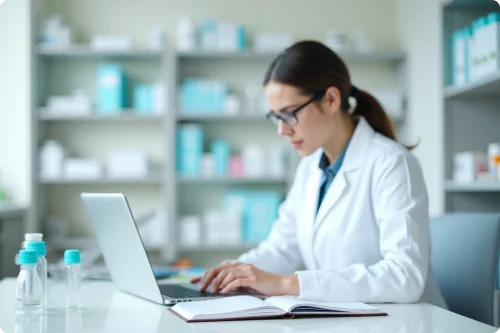ERP LMS for Pharmacy Colleges : A Smart Approach to Academic and Administrative Success
Introduction
Running a pharmacy college today involves more than teaching medicines and managing labs. Institutions must balance admissions, research, compliance, and placements—all while keeping students engaged. Traditional systems often struggle under this weight. That’s where an ERP LMS for Pharmacy Colleges comes in, offering a unified digital platform to handle both academic and administrative tasks with ease.
1. Academic Excellence with Digital Learning Tools
The core purpose of pharmacy education is to equip students with strong academic and practical knowledge. ERP LMS enhances this with features like online learning modules, e-content distribution, virtual classrooms, and digital assessments. Faculty can share notes, video lectures, and case studies in one place, ensuring students have 24/7 access to learning materials. Attendance tracking, exam scheduling, and grading are automated, saving valuable faculty time. The system also supports Outcome-Based Education (OBE), ensuring that course objectives align with PCI guidelines and industry standards. By digitizing academics, ERP LMS helps pharmacy colleges maintain consistency, improve teaching effectiveness, and deliver a smarter learning experience.
2. Administrative Efficiency and Process Automation
Running a pharmacy college involves multiple administrative tasks, such as admissions, fee collection, faculty management, and compliance reporting. ERP LMS streamlines these processes through centralized data management and automation. Admissions and fee payments can be handled online, reducing paperwork and manual errors. Faculty information, timetables, and leave management are organized in one platform, making operations smooth and transparent. Administrators also benefit from real-time dashboards for decision-making. By minimizing redundancy and paperwork, ERP LMS allows institutions to focus on their primary goal—delivering quality pharmacy education while keeping administration cost-effective and efficient.
3. Integrating Practical and Clinical Learning
Pharmacy education demands a strong balance between theory and practice. ERP LMS includes tools for lab scheduling, practical work tracking, and clinical training management. Students can record their lab experiments, submit reports online, and track their progress. Faculty can review practical performance and provide timely feedback, ensuring students develop hands-on skills. The platform also integrates clinical training records, internships, and research work, creating a holistic academic profile. This integration ensures students graduate with practical experience, making them ready for pharmaceutical industry roles or advanced research opportunities.
4. Analytics for Smarter Academic and Administrative Insights
ERP LMS provides powerful analytics and reporting tools that help both faculty and administrators. Teachers can track student performance, identify weak areas, and provide remedial interventions. Administrators gain insights into admissions, fee trends, faculty workload, and compliance readiness. For accreditation and audits, the system generates accurate and detailed reports quickly. These insights not only improve academic outcomes but also strengthen institutional credibility. By transforming raw data into actionable intelligence, ERP LMS ensures pharmacy colleges stay efficient, competitive, and future-ready.
5. Seamless Collaboration Between Stakeholders
Features like discussion forums, mentorship modules, and research collaboration tools create a connected ecosystem. Students can seek guidance from faculty, work in teams on research projects, and participate in academic discussions beyond the classroom. Administrators can share important notices, deadlines, and policy updates instantly. This seamless flow of communication reduces information gaps, strengthens student engagement, and enhances institutional transparency.
Why Pharmacy Colleges Need an ERP LMS?
Pharmacy education is unique. Unlike other academic fields, it demands a careful mix of theoretical knowledge, practical training, and strict compliance with regulatory authorities. Manual systems or disconnected software tools cannot keep pace with these requirements. An ERP LMS for Pharmacy Colleges ensures :
Transparency in student records.
Real-time monitoring of attendance and performance.
Integration of learning resources, labs, and examinations.
Automation of administrative tasks such as payroll, fee management, and admissions.
Academic Excellence Through ERP LMS
Students expect easy access to learning materials and faculty support. With ERP LMS, pharmacy colleges can :
Provide recorded lectures and e-books.
Share lab manuals and experiment reports digitally.
Track individual learning progress through dashboards.
Conduct online assessments with instant results.
For faculty, the system reduces repetitive tasks like manual grading, leaving more time for mentorship and research.
Administrative Efficiency
Administrators in pharmacy colleges face heavy workloads—admissions, staff payrolls, compliance reports, and more. ERP LMS helps by :
Automating fee collection with multiple payment options.
Generating financial reports for audits.
Streamlining recruitment, payroll, and HR management.
Offering one-click communication between staff, students, and parents.
This reduces paperwork, errors, and delays—ensuring a smooth operational flow.
Research and Compliance Support
Pharmacy colleges play a key role in advancing drug discovery and healthcare research. ERP LMS supports these efforts by :
Providing a central repository for research documents.
Tracking project milestones and progress reports.
Maintaining compliance records for regulatory authorities.
Enabling faculty-student collaboration on research projects.
With compliance reports just a click away, colleges save valuable time during audits and inspections.
Student Development and Placement
The goal of every pharmacy institution is to prepare students for industry roles. ERP LMS contributes by :
Offering career guidance modules.
Managing internships and tracking performance.
Connecting students with industry recruiters.
Maintaining alumni records for networking and mentoring.
Students graduate with not only knowledge but also practical experience, making them highly employable.
Key Benefits at a Glance
Unified academic and administrative platform.
Improved efficiency in admissions and examinations.
Transparent student and faculty records.
Better communication among stakeholders.
Stronger focus on student learning and career development.
Conclusion
An ERP LMS for Pharmacy Colleges is more than just software—it’s a complete solution for modern academic challenges. By adopting this technology, pharmacy institutions can build efficient operations, empower faculty, and prepare students for success in the pharmaceutical industry.

